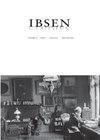The Mystic and Modernity: Unfolding Past and Present in Emperor and Galilean
IF 0.1
0 THEATER
引用次数: 1
Abstract
This issue of Ibsen Studies presents two pieces of original research on Ibsen that respectively represent the predominant scholarly traditions within the field, close textual analysis and performance history. Yet both authors, who are both emerging scholars based in Norway, break new ground in their choice of subject material. In “The Mystic and Modernity: Unfolding Past and Present in Emperor and Galilean,” Gerd Karin Omdal draws attention to the character Maximus, who is both mystic and philosopher and thus seemingly at odds with the exploration of modernity that the play is known for. Picking up from previous readings of the play that rule out the possibility of an unambiguously Christian and/ or idealist interpretation, Omdal focuses her attention on the role played by Maximus in conceptualizing the so-called “third empire” that would synthesize opposing pre-Christian and Biblical world views into something new. Whereas other scholars have placed primary emphasis on the philosophical tradition connected to Maximus, Omdal turns her attention instead to Maximus as mystic, contextualizing him within Neoplatonic and occult traditions. She argues that a synthesized understanding that encompasses both the philosophical and the mystical components of the character is necessary. In this, Omdal reflects a growing trend within the field of Scandinavian studies that seeks to examine the nineteenth-century fascination with the occult as an influential cultural phenomenon of the era, without in any way reproducing or espousing its pseudo-scientific beliefs. This is a welcome contribution because it opens up aspects of the text that have been ignored, perhaps because of a certain academic squeamishness or unwillingness to take such matters seriously as influential (if clearly misguided) cultural developments.神秘与现代:在《皇帝与伽利略》中展现过去与现在
本期《易卜生研究》提供了两篇关于易卜生的原创研究,分别代表了该领域的主要学术传统、密切的文本分析和表演史。然而,两位作者都是挪威的新兴学者,他们在主题材料的选择上开辟了新的天地。Gerd Karin Omdal在《神秘与现代性:在皇帝与伽利略中展现过去与现在》中提请人们注意马克西姆斯这个角色,他既是神秘主义者又是哲学家,因此似乎与该剧以探索现代性而闻名。根据之前对该剧的解读,奥姆达尔排除了明确的基督教和/或唯心主义解释的可能性,她将注意力集中在马克西姆斯在概念化所谓的“第三帝国”中所扮演的角色上,该帝国将把对立的前基督教和圣经世界观综合成新的东西。尽管其他学者主要强调与马克西姆斯有关的哲学传统,但奥姆达尔将注意力转向了马克西姆斯作为神秘主义者,将他置于新柏拉图主义和神秘主义传统的语境中。她认为,有必要综合理解人物的哲学和神秘成分。在这一点上,Omdal反映了斯堪的纳维亚研究领域的一种日益增长的趋势,即试图审视19世纪对神秘学的迷恋,将其视为当时一种有影响力的文化现象,而不以任何方式复制或支持其伪科学信仰。这是一个受欢迎的贡献,因为它揭示了文本中被忽视的方面,也许是因为某种学术上的拘谨或不愿认真对待这些有影响力(如果明显被误导的话)的文化发展。
本文章由计算机程序翻译,如有差异,请以英文原文为准。
求助全文
约1分钟内获得全文
求助全文

 求助内容:
求助内容: 应助结果提醒方式:
应助结果提醒方式:


